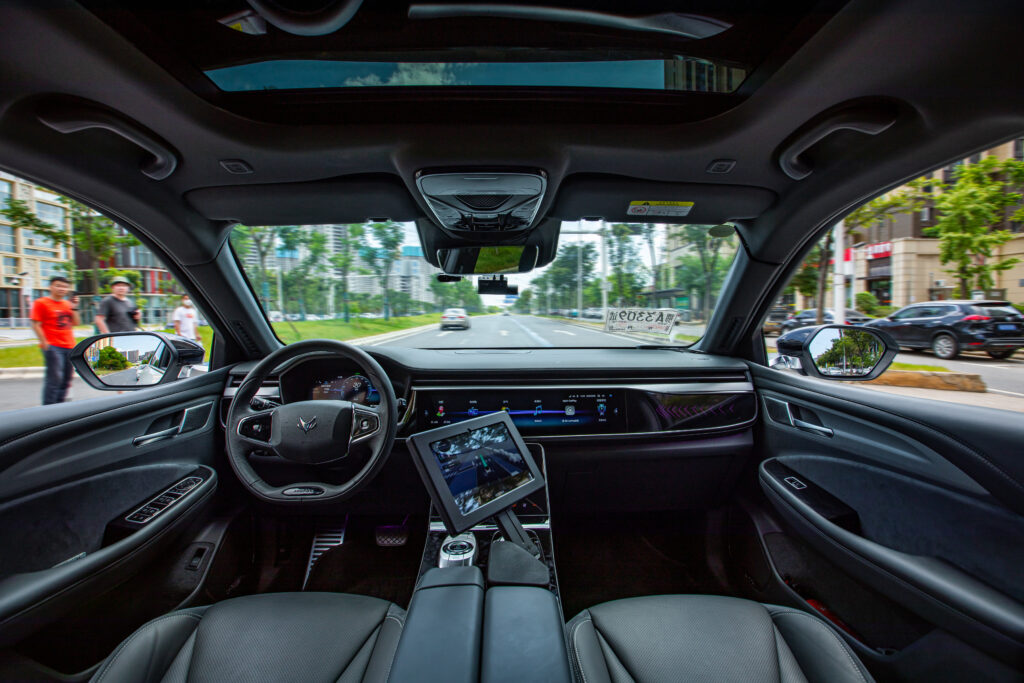Baidu, Inc. says it plans to build the world’s largest autonomous ride hailing service area in 2023. The announcement was made during Apollo Day, Baidu’s autonomous driving tech event. The plan outlined a goal to expand the operation area for Baidu’s fully driverless robotaxis, allowing Baidu to reach more potential customers, however, specific details about exactly where and how remain unclear. Additionally, Baidu revealed an AI big model built for autonomous driving perception, high-definition autonomous driving maps, a closed-loop autonomous driving data system and the successful end-to-end adaptation of AI chips for autonomous vehicles.
Since August 2022, Baidu has already rolled out fully driverless ride hailing services (with no human drivers in the car) in the cities of Chongqing and Wuhan, with access to hundreds of square kilometers of operation area. Based on this leading position, Baidu says it will continue to expand its operation area next year to build the world’s largest service area for a fully driverless robotaxi service.
Currently, Baidu’s autonomous ride hailing platform Apollo Go covers more than 10 cities in China including all first-tier cities. In Q3 2022 alone, Apollo Go had completed more than 474,000 rides, up 311% year over year, and a 65% increase compared to the previous quarter. In first-tier cities like Beijing and Shanghai, each robotaxi on Apollo Go can provide 15 rides a day on average, nearly the same daily ride average of typical online ride hailing car services, according to the company. By the end of Q3 2022, the accumulated rides provided to the public by Apollo Go had reached 1.4 million.
“Backed by its solid AI technology, Baidu Apollo has created a safe, intelligent and efficient autonomous driving technology system, bringing robotaxi services from designated zones to open roads at scale,” said Jingkai Chen, Baidu’s autonomous driving technology expert at the event. Baidu also said that the generalization ability of its autonomous driving technology had progressed at a more advanced pace than expected, with the lead time to deploy autonomous driving technology in a new city requiring only 20 days.
‘AI big model’ for autonomous driving
The AV industry has long grappled with the ‘long tail’ problem, in which an autonomous vehicle runs into a scenario it has not seen or experienced before. To address this problem, Baidu’s chief architect for computer vision, Jingdong Wang, announced what he described as “the industry’s first AI big model for autonomous driving” – a pre-trained visual language model with weak supervision, backed by the Baidu WenXin Big Model, which recognizes thousands of objects, helping to enlarge the scope of semantic recognition. The model is designed to enable autonomous vehicles to quickly make sense of an unseen object, such as special vehicle (fire truck, ambulance) recognition, plastic bag misdetection, and others. In addition, Baidu’s autonomous driving perception model – a sub-model of the WenXin Big Model – leveraging more than 1 billion parameters, is able to dramatically improve the generalization potential of autonomous driving perception.
HD map
Apollo Day also saw an announcement regarding a new HD map for autonomous driving. Using AI to increase efficiency and bring down cost, the automation rate of Baidu’s high-precision map production has now reached 96%, while the integration of vehicle-gathered perception data and multisource maps to generate online maps in real time ensures greater safety for autonomous driving. The company says that with more than 12 million kilometers of road networks and data accumulated on Baidu Maps, along with hundreds of millions of human drive-hours, Baidu’s new HD autonomous driving map effectively integrates these datapoints to improve the reliability of autonomous driving.
“Baidu’s new-generation autonomous driving map is equipped with comprehensive capabilities such as automatic production, real-time fusion and knowledge enhancement,” said Jizhou Huang, Baidu’s autonomous driving technology expert, who added that the map will now be put into mass production to realize a “safe, reliable and efficient” autonomous driving experience.
Closed-loop data system and AI chip
Ang Li, principal scientist, introduced the concept of ‘Fine Purification, Strong Ingestion’ and Apollo Loop, a closed-loop data system, to effectively identify and utilize data captured during testing and robotaxi operation. To purify the data, the system leverages both onboard small AI models and a cloud-based big AI model to achieve high-efficiency data mining and automated labeling, according to Li. The data ingestion architecture achieves automated training with its group optimization ability and data distribution understanding to effectively utilize data and further enhance the overall intelligence of autonomous driving.
Baidu is also actively bringing autonomous driving technology to empower advanced assisted driving products. Autonomous driving technology expert Liang Wang explained how Baidu is leveraging its decade-long experience in autonomous driving to explore a technical route through which L4 and L2+ autonomous driving can coexist. Currently, the technology stack level enables the unification of L4 and L2+ smart driving products in terms of visual perception scheme, technical architecture, map unification, data interconnection and infrastructure sharing. Baidu envisions a mutually beneficial relationship in which L4 will continue to provide advanced technology migration for L2+ smart driving products in urban use cases, while L2 data feedback will also help to improve L4 generalization ability.
Finally, Jian Ouyang, CEO of Kunlun Chip (and former chief chip architect at Baidu) revealed that Baidu’s 2nd-gen Kunlun AI chip is now ready to support autonomous functionality having “completed an end-to-end performance adaptation for autonomous driving”. The semiconductor unit was spun off from Baidu in 2021, following the release of its in-house XPU architecture in 2017. Ouyang said the company is now mass producing 2G chips capable of 128TFLOPS and 16FP, adding that it is the first 7nm, high-speed GDDR6 DRAM in China.


